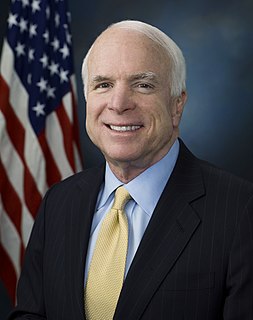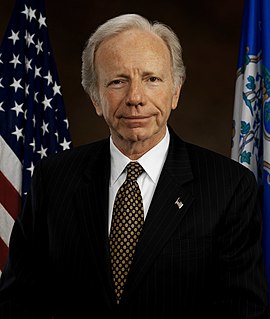
John Sidney McCain III was an American politician and United States Navy officer, who served as a United States Senator for Arizona from 1987 until his death in 2018. He previously served two terms in the United States House of Representatives and was the Republican nominee for president of the United States in the 2008 election, which he lost to Barack Obama.

Joseph Isadore Lieberman is an American politician, lobbyist and attorney who served as a United States Senator from Connecticut from 1989 to 2013. A former member of the Democratic Party, he was its nominee for Vice President of the United States in the 2000 election. During his final term in office he was officially listed as an independent Democrat and caucused with and chaired committees for the Democratic Party.

William Kristol is an American neoconservative political analyst. A frequent commentator on several networks, he was the founder and editor-at-large of the now-defunct political magazine The Weekly Standard. Kristol is now editor-at-large of The Bulwark.

Richard Green Lugar was an American politician who served as a United States Senator from Indiana from 1977 to 2013. He was a member of the Republican Party.

The Authorization for Use of Military Force Against Iraq Resolution of 2002, informally known as the Iraq Resolution, is a joint resolution passed by the United States Congress in October 2002 as Public Law No. 107-243, authorizing the use of the United States Armed Forces against Saddam Hussein's Iraq government in what would be known as Operation Iraqi Freedom.

Carl Milton Levin is an American attorney and retired politician who served as a United States Senator from Michigan from 1979 to 2015. He was the chair of the Senate Committee on Armed Services and is a member of the Democratic Party.

Charles Timothy Hagel is an American military veteran and former politician who served as a United States Senator from Nebraska from 1997 to 2009 and as the 24th United States Secretary of Defense from 2013 to 2015 in the Obama administration.

Hillary Clinton, the nominee of the Democratic Party for president of the United States in 2016, has taken positions on political issues while serving as First Lady of Arkansas, First Lady of the United States (1993–2001); as U.S. Senator from New York (2001–2009); and serving as the United States Secretary of State (2009–2013).
The Democratic Party is one of the two major contemporary political parties in the United States, along with its main, historic rival, the Republican Party. Tracing its heritage back to Thomas Jefferson and James Madison's Democratic-Republican Party, the modern-day Democratic Party was founded around 1828 by supporters of Andrew Jackson, making it the world's oldest active political party.

Joe Lieberman is an American politician, having served as a United States Senator from Connecticut from 1989 to 2013. A former member of the Democratic Party, he was the party's nominee for Vice President in the 2000 election. Currently he is an Independent.
Joe Biden, President-elect of the United States, served as Vice President from 2009 to 2017 and in the United States Senate from 1973 until 2009. A member of the Democratic Party, he made his second presidential run in 2008, later being announced as Democratic presidential nominee Barack Obama's running mate in 2008. He was elected Vice President in 2008 and reelected in 2012. In April 2019, Biden announced his 2020 presidential campaign. He became the presumptive Democratic nominee in April 2020, was formally nominated by the Democratic Party in August 2020, and defeated Republican incumbent Donald Trump in the November 2020 election.

Hillary Rodham Clinton served as a United States Senator from New York from January 3, 2001 to January 21, 2009. She won the United States Senate election in New York, 2000 and the United States Senate election in New York, 2006. Clinton resigned from the Senate on January 21, 2009 to become United States Secretary of State for the Obama Administration.

The 2004 presidential campaign of Joe Lieberman, the long-time United States Senator from Connecticut and the vice-presidential nominee under Al Gore in the previous election, began on January 13, 2003, when he announced his intention to seek the Democratic nomination as a candidate in the 2004 presidential election. Describing his Presidential hopes, Lieberman opined that his historically hawkish stance would appeal to voters. Prior to his defeat in New Hampshire, Lieberman famously declared his campaign was picking up "Joementum". On February 3, 2004, Lieberman withdrew his candidacy after failing to win any of the five primaries or two caucuses held that day. He acknowledged to the Hartford Courant that his support for the war in Iraq was a large part of his undoing with voters.

The United States Senate career of Barack Obama began on January 3, 2005, and ended on November 16, 2008. He resigned his seat in the U.S. Senate upon being elected President of the United States. Obama won the seat in an election against Alan Keyes who replaced Republican Primary election winner Jack Ryan.
This article compares the presidential candidates in the United States' 2008 presidential election. It does not cover previous elections. Because of ballot access restrictions in the United States, not all candidates appeared on the ballots in all states.

U.S. Senator John McCain (R-AZ), a member of the U.S. Congress from 1983 until his death in office in 2018, a two-time U.S. presidential candidate, and the nominee of the Republican Party in the 2008 U.S. Presidential election, took positions on many political issues through his public comments, his presidential campaign statements, and his senatorial voting record.

Former United States Senator Harry Reid has declared his position on many political issues through his public comments and his senatorial voting record.

Rand Paul is a member of the Republican Party, a U.S. Senator representing the state of Kentucky, and a former candidate for President of the United States. He received a score of 100% from the American Conservative Union in 2012, and his voting record was rated 26% liberal in 2011 by National Journal.
The platform of the Democratic Party of the United States is generally based on American liberalism, contrasting with the conservatism of the Republican Party. The party has large centrist and progressive wings, as well as smaller conservative and socialist elements.
The Republican Party of the United States has held a variety of views on foreign policy and national defense over the course of its existence. Generally speaking, it has advocated for a more militaristic foreign policy. Republican presidents have joined or started a number of wars over the course of American history, with mixed results.














